- Home
- Susan Hill
Betrayal of Trust Page 14
Betrayal of Trust Read online
Page 14
‘Thank you,’ Simon said.
Sir John sighed and after a moment wiped his eyes. Simon let him come to.
‘When you’re ready …’
‘I am.’
‘Thank you. I need to ask one or two questions about the few days before Harriet’s disappearance. Had there been any trouble at all – even a few hot words between her and her mother or you, about something trivial – a messy room, bedtimes, not eating, boyfriends … the usual sort of teenage things?’
‘None. There was nothing. I went over all this in my mind at the time – every detail, every conversation. There was nothing. But, you see, there never was.’
‘Never?’
‘She was such an easy girl to bring up.’ Lowther’s eyes were cloudy with pain. ‘She was a bit of a noisy toddler at one stage … liked to bang things … spoons on tables, feet on the floor … it passed very quickly.’
‘Had you seen her that morning?’
‘I had, yes. I passed her on the landing as she was going to the bathroom just after her mother had woken her … I was on my way out. I said something to her.’
‘Can you remember what?’
‘No. But probably hello – good morning. You know.’
‘What did you call her?’
‘I’m sorry?’
‘Did you call her Harriet – or Hattie? Something else?’
‘Always Harriet. She was never Hattie to us, though some of her friends used it … she preferred Harriet. Occasionally …’
Simon did not prompt him.
‘Occasionally I called her Alice.’
‘Her middle name?’
‘No. Alice in Wonderland was her favourite book. I read it to her night after night when she was six or seven. She played Alice in a school production when she was eleven. It was a musical version. She had quite a pleasant singing voice – tuneful. I liked to listen to her.’
‘Did she sing a lot?’
‘Around the house, yes. And she was in the school West Side Story.’
‘Did you see her again that day she disappeared?’
‘No. I heard her upstairs but she hadn’t come down before I left as usual at around a quarter to eight.’
‘You drove in to work?’
‘Yes. I could have had a car … chauffeur. I hate all that. I like to drive.’
‘How did Harriet get to school?’
‘Usually one of us drove her into town and she caught the school bus from the square. Occasionally we gave her a lift all the way, if she had a lot of things to carry – sports gear and so on. But that day was in the holidays, of course.’
‘The rest of your day?’
‘I had meetings all morning, lunch with some clients.’
‘Where did you lunch?’
‘At the factory. We have – had – a dining room. A cook. Much the best.’
‘And in the afternoon.’
‘I worked … and I went for a walk. The factory is set in rather fine grounds. I often walked there. I hate not having some fresh air and space to think at least once in the day.’
‘What time did you go out?’
‘About a quarter past three.’
‘Until?’
‘I walked for around half an hour, as usual.’
‘What kind of day was it?’
‘Oh, it was a beautiful day … warm, sunny … it was a …’ He cleared his throat.
‘Did you walk outside the grounds of the factory?’
‘No.’
‘And so you came back inside at around four?’
‘I think so. This is all in the original interview.’
‘Yes. What did you do for the rest of the afternoon?’
‘Worked at my desk. I think I made a few phone calls. I had a lot of papers to read about another company we were planning to take over.’
‘Would your secretary have remembered the time you came back in? Did she bring you tea?’
‘You know the answer to that.’
‘Could you tell me?’
‘My secretary was off – she was going to a wedding some distance away the next day.’
‘And no one was standing in for her?’
‘No. It was Friday afternoon. I didn’t need anyone.’
‘So you made your own phone calls?’
‘Yes. I liked to do things for myself. My secretary, Gillian, was invaluable but I never wanted a secretary to wait on me … for the same reason I liked to drive myself. I still do.’
‘What time did you leave your office?’
‘Just before six. Perhaps ten to? I was reading some company reports. I put the rest of them in my briefcase to go through at home that weekend.’
‘Had everyone else gone by then?’
‘Not the security staff or the doorman. But the factory itself closed at four on Friday and the offices at five.’
‘Did anyone see you leave?’
‘Ernie – the doorman. There’s confirmation of that in your files.’
‘Yes. Did you drive straight home?’
‘Yes. No – I stopped for a paper. I like to get the local paper. And some pipe tobacco. I had a rule only to smoke at the weekends. Eve never cared for the smell of my pipe. I stopped altogether some years ago.’
‘Where did you buy the paper?’
‘The newsagent’s on Mercy Way … it’s closed now. There’s a confirmation of that too, I believe.’
‘Yes. What time did you get home?’
‘About six thirty. By then Eve was back – Harriet hadn’t met her as arranged. Eve had been trying to call me at work and missed me. Of course nowadays I would have had a mobile phone – so would she. So would … Harriet.’
‘Your wife had reported Harriet missing by the time you got home?’
‘Your people were already at the house. I saw the police car as I drove in. Eve was at the door. I can see them now. They were very good. Their kindness … I know they had to ask me those questions … where I had been, what time …’
‘Yes.’
They were both silent.
Simon did not return to the station after leaving the Old Mill but drove a couple of miles on, to a pub he sometimes visited when he didn’t want to meet anyone he knew. The place was quiet – it was still short of twelve thirty – and he ordered a home-cooked-ham sandwich and a half-pint of the locally brewed ale called, for some reason, the Snoddy.
When the thick slabs of fresh bread and ham with mustard arrived, he sat quietly for several minutes, clearing his mind of the morning’s interview with Lowther. He had come here in order to think about something else.
He drank, then took out his phone.
He had chosen a corner seat. To his right were two empty tables. The bar was at the far end, so the sound of voices was not going to disturb him.
There was nothing to disturb him.
He took another couple of draughts but did not eat. He would ring first. Eat afterwards. Once he knew.
It had been easy to find the phone number of course. He had the card on which he had scribbled it down in his wallet. He took it out. He finished his beer and picked up his phone.
For a few seconds there was no connection. A bad line, a wrong number? Why was he doing this?
Because he had sat next to a woman at a dinner and …
And what? For Christ’s sake. And nothing. An attraction? A fleeting connection but nothing else because there had not been time, it had not been the occasion, and besides … He heard the dialling tone.
She came into his mind. Her face, her hands, the curve of her arm, the line of her mouth, clear and distinct, along with the glittering lights and the gleaming silver and the sound of a room of people talking, the smell of candle smoke.
How long had it been since he had experienced anything like this? Freya. He remembered Freya and with a sense of great sadness. But he could not bring her face to mind, could not remember her voice. Freya had gone.
‘Hello. This is the answerphone for Kenneth and Rac
hel Wyatt. We aren’t able to take your call. Please would you leave a message? Thank you.’
Her voice was utterly familiar, as though he had been hearing it all his life, and listening to the message unnerved him, so he disconnected quickly, leaving no message.
He left the pub and strolled up the lane in the cool, bright afternoon. A donkey stood by a field gate and he stopped to scratch its ears, thinking he might come back to draw it.
His phone beeped a text.
Come 2 supper? Steak pie. Not seen u 4 ages. X
He was answering Cat when the phone rang, but in the confusion of ceasing to text and then replying, he pressed the key but did not give his name.
‘Hello? I think someone rang? This is Rachel Wyatt.’
‘Yes. I rang.’
She hesitated a long moment then said, ‘Simon?’
‘Yes.’
‘How did you – Ah. Yes. But you didn’t leave a message.’
‘No.’
‘Are you at the station?’
‘No. I’m in a lane near a pub. I just had lunch. Can I see you?’
‘Now? No, it’s –’
‘Not now. I have to get back. This evening? Could we meet this evening?’
‘I’m not sure …’
‘A drink?’
‘I’m not sure. I would have to …’ She stopped.
‘If you’d rather not, it’s fine, of course.’ Though it wasn’t.
‘No. No, I want to. Can I let you know a bit later? Or should I not ring you?’
‘It’s fine. I have to go and interview someone but you can leave me a message. Or send a text. Will you?’
‘Yes.’
‘I’ll be back at the station around four. When can you ring?’
‘Simon, I don’t know. Just … I will if I can.’
‘OK.’
‘But … it’s nice to hear from you. What a non-word that is – “nice”.’
He laughed. ‘I’m happy with nice.’
‘I’ll ring.’
‘And meet me. Try and meet me.’
Twenty-four
HE WOULD HAVE recognised Katie Cadsden – now Katie Morris – from the photographs of her in the files, though she had been fifteen then, was thirty-one now. She had small sharp features but a wide mouth.
The house was on one of the new estates that had sprung up in the past decade between Bevham and Lafferton. It was neat, clean, detached, pleasant, but with all the character of a show home. Perhaps it had been a show home, Serrailler thought, as she led him into the sitting room. It overlooked a small garden. Grass. No borders. An octagonal cedar summerhouse at the end. A fence.
‘Please sit down. I was making some tea. I try to keep the day to its normal pattern even when I’m on night shift, otherwise there’s no logic to your life. I don’t suppose you do night shifts, do you?’
‘Not officially but I still get called out.’
‘How do you like your tea, Superintendent?’
He waited on the camel-coloured sofa, his feet on a cream rug. The walls were off-white with a couple of bland landscape pictures and a pale-framed mirror. Blonde-wood sideboard. Television tucked into one corner. A glass-topped table with a few magazines, splayed out in a fan. The sofa had coffee-coloured velour cushions. There was a tall plant in a china container beside the door. Show home. It was also very markedly a home without children or animals. It smelled faintly of vanilla.
He thought of his sister’s farmhouse, tumbled with children, cat and dog, books and papers, folders and files, games and rugs and coffee mugs, always clean, never tidy.
Katie Morris came in with a handled tray of pale wood. China teapot, small china mugs, a plate of iced biscuits, arranged in a circle.
‘How long have you been at Bevham General?’
She set the tray down. ‘I trained there, did general nursing, then I went to the National Heart Hospital for two years and that was it. I became a scrub nurse, theatre sister. Then back home. I can’t see me moving again. And of course I met Dave.’
She poured tea and handed it to Simon, then sat in the blonde-covered chair opposite to him.
‘But you came to talk about Harriet, didn’t you? This will sound awful but I’m just so glad you’ve found her – never mind the rest, I’m just glad. Not knowing, always at the back of my mind … Where is she? Is she OK? Can she be alive? If she’s dead, where have they put her? All that. This is something else to get my head round but still …’
‘I think her father feels the same way.’
‘So would her mother. It killed her, you know. Indirectly, directly, whatever. Harriet disappearing like that killed her. I wish she could know. At least puts something to rest, doesn’t it?’
‘Would you mind telling me something about Harriet? What sort of girl she was?’
‘I said all that – you can find it in the files, surely?’
‘I can. But I’d like you to tell me about her now. Time can lend a different perspective and you gave that interview when you were shocked and upset.’
She set down her mug and leaned back. This was always the moment when Simon knew he must not prompt – must not say anything at all. He watched her. Her face took on a slightly distant expression as she brought Harriet Lowther to mind again and tried to organise her thoughts. He looked out of the window. A few plants in pots or even a climber up the fence would have made it look less raw. Perhaps they had not lived here for long and this time next year it would be rich with colour and foliage – but he somehow doubted it.
‘Self-contained,’ she said now. ‘Everyone thought of Harriet as self-contained and maybe she was. In school, if she came to tea with us … she was quiet. She worked hard. She wasn’t the cleverest by a long chalk but she was good at maths, though she couldn’t get her head round languages at all, so she got tapes out of the library and listened to them till she got better. That’s how she was. She loved music. And tennis. Most games actually but tennis was her real thing. Tennis. Music. Maths.’
She stopped and leaned forward to pour more tea, offering the pot to Simon but he shook his head. She was still with Harriet. He didn’t want her to come back yet.
‘She was pretty self-sufficient. I mean, I was her friend, probably her best friend, and she got on fine with most people, but you always got the feeling she’d be just as happy by herself. Or with …’ She hesitated and looked at him.
‘Go on.’
‘It sounds funny but, well, with older people … she liked being with adults. She liked my mum and other people’s parents, she liked most of the teachers. I don’t mean she sucked up to them or anything … she just liked to talk to them.’
‘Anyone in particular?’
‘I’m not sure. You know, I haven’t said this before … it’s only looking back that I wonder. I just sensed there was someone, some particular friend.’
‘A boyfriend?’
‘I don’t know. No. It wasn’t that she ever said anything … the opposite really. But she’d say she couldn’t come into town after school or on Saturday morning because she was “doing something”. But she never said what. I don’t think it was a family thing or she’d have just said, wouldn’t she? I mean, she did sometimes say “I’m going to London with Mum and Dad” – that sort of thing. But I just got the feeling this was different. I don’t know now. I could have imagined it. I probably did.’
‘Did she ever mention a boyfriend?’
‘Never. We all talked about boys – the ones at the Cathedral School, and at Burdon Hall – not at the Comp, we didn’t really know anyone there. A few people had boyfriends, but she didn’t. At least, if she did she kept it very dark.’
‘So what makes you think there was someone – some friend she often saw?’
Katie shook her head. ‘I don’t know. I did ask her once … she said she wasn’t going straight home, she was meeting someone in town, and I asked who but she just – I think she pretended not to hear. Maybe you’d better just forget it.’
<
br /> He did not reply. But he would not forget it.
‘I know you said everything about the day she disappeared and we’ve got your original statement, but I’d like you to go over it again, if you would. Think yourself back – and try to remember it as if this were the first time you’d had to tell anyone. I know it’s difficult but –’
‘No. I owe it to Harriet. Everybody does.’
She sat forward and stared out of the window, not seeing what was there, seeing a different day.
He listened, waiting, waiting for something else, something new, something previously forgotten, trivial, mentioned in passing, vital, but there was nothing and he knew it had been too much to expect otherwise.
Then she said, ‘I did wonder for a minute though – she said she was meeting her mother at the hairdresser’s in the square and they said it on the television, on the news. Her mother was saying it. “We’d arranged to meet up at my hairdresser’s but Harriet never arrived.” So it must have been true. But … no, nothing.’
He waited, knowing that she was going to venture it, even so.
‘I just wondered if she was going somewhere else – meeting someone else. There was just something in the way she said it. Only – well, I was wrong, wasn’t I?’
‘Had she ever done that, to your knowledge? Told you where she was going but actually planning to be somewhere different?’
‘If she had I didn’t find out. I said she was quiet and that’s true. But sometimes it wasn’t just quiet – it was closed up. Oyster-like. You always wondered what was going on inside her head. She made you feel like there was something. I’ve met people like that since – you get a feeling they’re carrying these huge secrets or have a fascinating other life. Well, they’re not. They’re just not. What you see is what you get.’

 Mrs De Winter
Mrs De Winter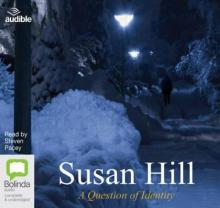 A Question of Identity
A Question of Identity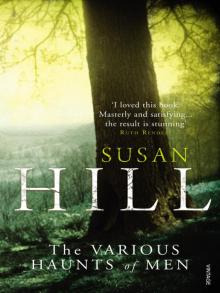 The Various Haunts of Men
The Various Haunts of Men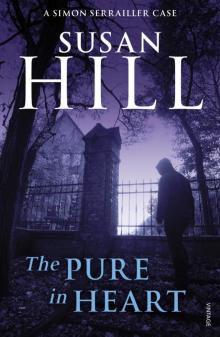 The Pure in Heart
The Pure in Heart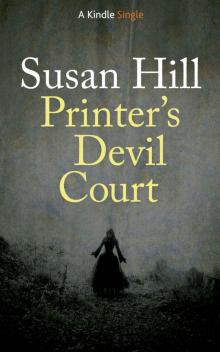 Printer's Devil Court
Printer's Devil Court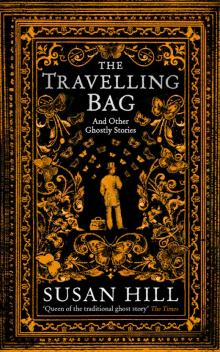 The Travelling Bag
The Travelling Bag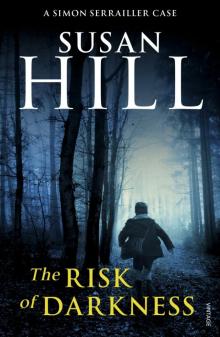 The Risk of Darkness
The Risk of Darkness A Kind Man
A Kind Man Black Sheep
Black Sheep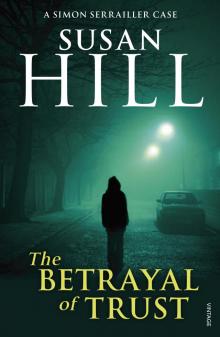 The Betrayal of Trust
The Betrayal of Trust The Service of Clouds
The Service of Clouds Betrayal of Trust
Betrayal of Trust The Small Hand
The Small Hand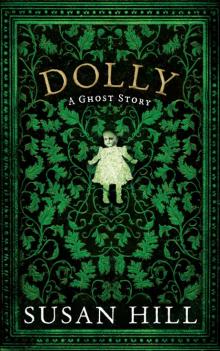 Dolly
Dolly Jacob's Room Is Full of Books: A Year of Reading
Jacob's Room Is Full of Books: A Year of Reading The Vows of Silence
The Vows of Silence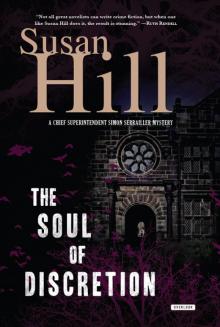 The Soul of Discretion
The Soul of Discretion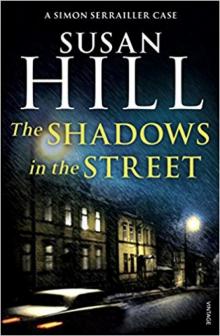 The Shadows in the Street
The Shadows in the Street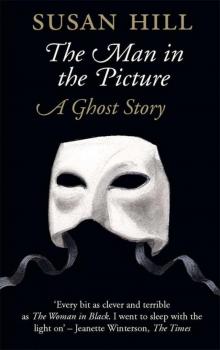 The Man in the Picture
The Man in the Picture Air and Angels
Air and Angels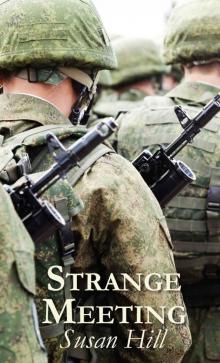 Strange Meeting
Strange Meeting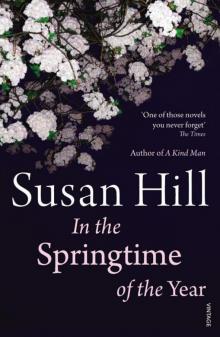 In the Springtime of the Year
In the Springtime of the Year Howards End Is on the Landing: A Year of Reading From Home
Howards End Is on the Landing: A Year of Reading From Home From the Heart
From the Heart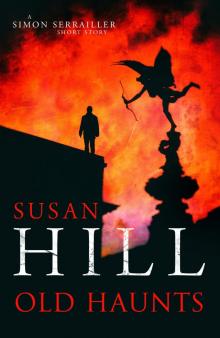 Old Haunts
Old Haunts The Mist in the Mirror
The Mist in the Mirror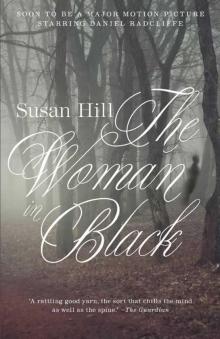 The Woman in Black: A Ghost Story
The Woman in Black: A Ghost Story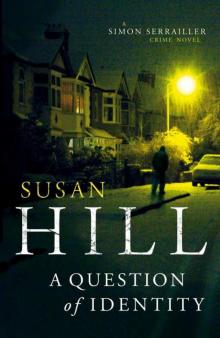 A Question of Identity (Simon Serrailler 7)
A Question of Identity (Simon Serrailler 7)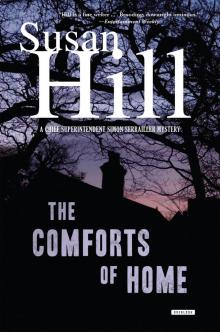 The Comforts of Home
The Comforts of Home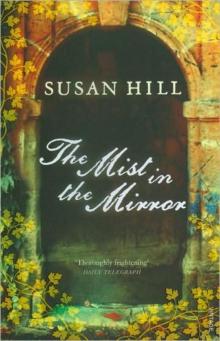 Mist in the Mirror
Mist in the Mirror Jacob's Room is Full of Books
Jacob's Room is Full of Books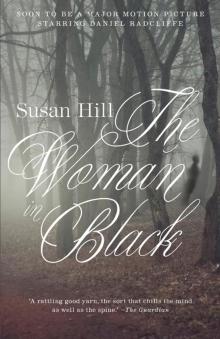 The Woman in Black
The Woman in Black Howards End is on the Landing
Howards End is on the Landing